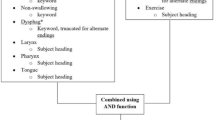Abstract
Data demonstrating the efficacy of behavioral methods for treating dysphagia are in short supply. This paper defines efficacy and distinguishes it from efficiency. It highlights the attitudes, measures, decisions, and data essential to the design of clinical trials. The need for additional outcome measures and for establishing appropriate treatment intensities are emphasized.
Similar content being viewed by others
References
Struggling with aphasia. Medical World News 10:37–40, 1969
Medawar PB: Advice to a Young Scientist. London: Basic Books, 1979, p 50
Ingham JC: Issues of treatment efficacy: design and experimental control. In: Olswang LB, Thompson CK, Warren SF, Minghetti NJ (eds.): Treatmetn Efficacy Research in Communication Disorders. Rockville, MD: American Speech-Language-Hearing Foundation, 1990, pp 51–61
DePippo KL, Holas MA, Reding MJ, Mandel FS, Lesser ML: Dysphagia therapy following stroke: a controlled trial. Neurology 44:1655–1660, 1994
Langmore SE, Miller RM: Behavioral treatment for adults with oropharyngeal dysphagia. Arch Phys Med Rehabil 75:1154–1160, 1994
Miller RM, Langmore SE: Treatment efficacy for adults with oropharyngeal dysphagia. Arch Phys Med Rehabil 75:1256–1262, 1994
Judson HF: The Search for Solutions. New York: Holt, Rinehart and Winston, 1980, p 171
Wilson EO: Naturalist. Washington, DC: Island Press/Shearwater Books, 1994
World Health Organization. Internationl classification of impairements, disabilities and handicaps. Geneva, Switzerland, 1980
Goldstein H: Assessing clinical significance. In: Olswang LB, Thompson CK, Warren SF, Minghetti NJ (eds.): Treatment Efficacy Research in Communication Disorders. Rockville, MD: American Speech-Language-Hearing Foundation, 1990, pp 91–98
Spilker B (ed.) Quality of Life Assessments in Clinical Trials. New York: Raven Press, 1990
Cooper JA: Treatment studies and research design: an NIH perspective. In: Olswang LB, Thompson CK, Warren SF, Minghetti NJ: (eds.): Treatment Efficacy Research in Communication Disorders. Rockville, MD: American Speech-Language-Hearing Foundation, 1990, pp 41–50
Logemann JA: Evaluation and Treatment of Swallowing Disorders. San Diego: College-Hill Press, 1983
Lazzara G, Lazarus C, Logemann JA: Impact of thermal stimulation on the triggering of the swallowing reflex. Dysphagia 1:73–77, 1986
Rosenbek JC, Robbins J, Fishback B, Levine RL: The effects of thermal application on dysphagia after stroke. J Speech Hear Res 34:1257–1268, 1991
Schmidt J, Holas M, Halvorson K, Reding M: Videofluoroscopic evidence of aspiration predicts pneumonia and death but not dehydration following stroke. Dysphagia 9:7–11, 1994
Martin BJW, Corlew MM, Wood H, Olson D, Golopol LA, Wingo M, Kirmani N: The association of swallowing dysfunction and aspiration pneumonia. Dysphagia 9:1–6, 1994
Langmore SE: Managing the complications of aspiration in dysphagic adults. Semin Speech Language 12:199–207, 1991
Scheld WM, Mandell GL: Nosocomial pneumonia: pathogenesis and recent advances in diagnosis and therapy. Rev Infect Dis 13(Suppl 9):743–751, 1991
Logemann JA: Criteria for studies of treatment for oral-pharyngeal dysphagia. Dysphagia 1:193–199, 1987
Alberts MJ, Horner J, Gray L, Brazer SR: Aspiration after stroke: lesion analysis by brain MRI. Dysphagia 7:170–173, 1992
Siegel GM: The limits of science in communication disorders. J Speech Hear Disord 52:306–312, 1987
Author information
Authors and Affiliations
Rights and permissions
About this article
Cite this article
Rosenbek, J.C. Efficacy in dysphagia. Dysphagia 10, 263–267 (1995). https://doi.org/10.1007/BF00431420
Issue Date:
DOI: https://doi.org/10.1007/BF00431420




